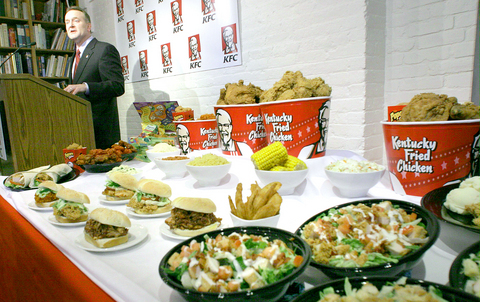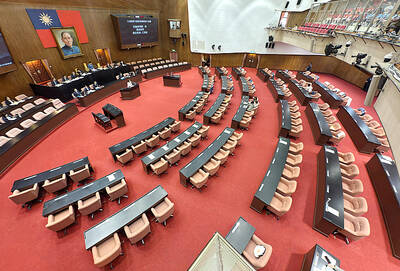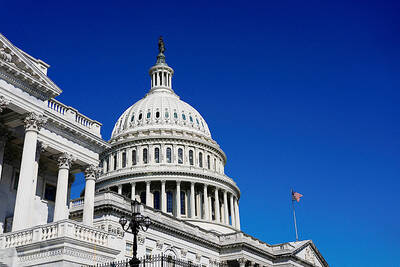The war against trans fat registered a major victory on Monday as Kentucky Fried Chicken (KFC) -- whose main course is deep fried -- announced that it would remove the artery-clogging substance from its fryers.
KFC said it would replace partially hydrogenated soybean oil with a type of soybean oil that does not contain trans fat at its 5,500 restaurants in the US.
The conversion, which came after two years of testing, is expected to be completed by April. While trans fat will be eliminated from KFC's chicken and its other fried products, it will remain in its biscuits, potpies and some desserts because a good alternative has not yet been found.

PHOTO: AP
Officials at KFC, a subsidiary of Yum Brands of Louisville, Kentucky, said the change in cooking oils would have no impact on the taste of its food.
By getting rid of trans fat in its cooking oil, KFC follows the lead of Wendy's International, the hamburger chain, which announced in June that it was eliminating trans fat from the cooking oil used at its US restaurants.
Public health advocates hailed KFC's decision as a major step in efforts to rid the US diet of trans fat. New York City and Chicago are considering regulations that would ban artificial trans fat from restaurants, and many food companies have eliminated trans fat from their products.
"The more companies change, Wendy's, then KFC, it's demonstrating to the restaurant industry that it's possible, that it's not some pie-in-the-sky dream," said Michael Jacobson, executive director of the Center for Science in the Public Interest.
Jacobson's group sued KFC in June, seeking to force the restaurant chain to quit using partially hydrogenated oils; his group withdrew from the lawsuit after KFC's announcement on Monday.
Partially hydrogenated oils contain trans fat, which is considered especially unhealthy because it raises levels of bad cholesterol while lowering good cholesterol, clogging arteries and causing heart disease.
As Jacobson noted, KFC's announcement could put pressure on other fast-food restaurants to eliminate trans fat from its cooking oil. The pressure may be particularly acute for McDonald's, which announced in 2002 that it was reducing trans fat in its cooking oil, but has since struggled to make the switch.
In a statement on Monday, Catherine Adams, McDonald's vice president for worldwide quality, food safety and nutrition, said the firm was "researching and testing oil alternatives and are encouraged with the progress we are making."
While McDonald's is committed to reducing trans fat significantly in its cooking oil, she said, "Our priority is to also meet our customer expectations for taste and quality."
David Palmer, an analyst at UBS Investment Research, said KFC's decision should reduce its litigation risks. As for McDonald's, he said there was considerable risk in changing the recipe for its French fries, given their revered status.
But he said there was also peer pressure and litigation risk for McDonald's if it does not get rid of trans fat. Palmer said that if competitors were doing something good for people, "you don't want to stick out as the one that is not acting."
In Taiwan, the fast-food chain's local representative yesterday said that it had made the switch in its fryers early this year.
According to Olga Wu (
additional reporting by Jackie Lin

The Chien Feng IV (勁蜂, Mighty Hornet) loitering munition is on track to enter flight tests next month in connection with potential adoption by Taiwanese and US armed forces, a government source said yesterday. The kamikaze drone, which boasts a range of 1,000km, debuted at the Taipei Aerospace and Defense Technology Exhibition in September, the official said on condition of anonymity. The Chungshan Institute of Science and Technology and US-based Kratos Defense jointly developed the platform by leveraging the engine and airframe of the latter’s MQM-178 Firejet target drone, they said. The uncrewed aerial vehicle is designed to utilize an artificial intelligence computer

The Chinese Nationalist Party (KMT) caucus yesterday decided to shelve proposed legislation that would give elected officials full control over their stipends, saying it would wait for a consensus to be reached before acting. KMT Legislator Chen Yu-jen (陳玉珍) last week proposed amendments to the Organic Act of the Legislative Yuan (立法院組織法) and the Regulations on Allowances for Elected Representatives and Subsidies for Village Chiefs (地方民意代表費用支給及村里長事務補助費補助條例), which would give legislators and councilors the freedom to use their allowances without providing invoices for reimbursement. The proposal immediately drew criticism, amid reports that several legislators face possible charges of embezzling fees intended to pay

REQUIREMENTS: The US defense secretary must submit a Taiwan security assistance road map and an appraisal of Washington’s ability to respond to Indo-Pacific conflict The US Congress has released a new draft of the National Defense Authorization Act (NDAA), which includes up to US$1 billion in funding for Taiwan-related security cooperation next year. The version published on Sunday by US House of Representatives Speaker Mike Johnson removed earlier language that would have invited Taiwan to participate in the US-led Rim of the Pacific Exercise (RIMPAC). A statement on Johnson’s Web page said the NDAA “enhances U.S. defense initiatives in the Indo-Pacific to bolster Taiwan’s defense and support Indo-Pacific allies.” The bill would require the US secretary of defense to “enable fielding of uncrewed and anti-uncrewed systems capabilities”

Renewed border fighting between Thailand and Cambodia showed no signs of abating yesterday, leaving hundreds of thousands of displaced people in both countries living in strained conditions as more flooded into temporary shelters. Reporters on the Thai side of the border heard sounds of outgoing, indirect fire yesterday. About 400,000 people have been evacuated from affected areas in Thailand and about 700 schools closed while fighting was ongoing in four border provinces, said Thai Rear Admiral Surasant Kongsiri, a spokesman for the military. Cambodia evacuated more than 127,000 villagers and closed hundreds of schools, the Thai Ministry of Defense said. Thailand’s military announced that